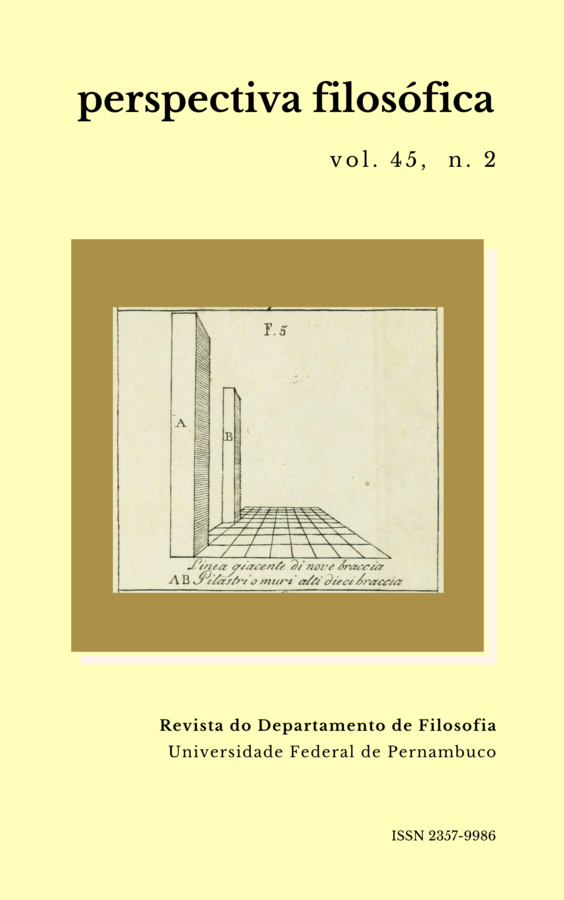Emoções são mesmo intencionais? Considerações para uma teoria adverbial das emoções
DOI:
https://doi.org/10.51359/2357-9986.2018.244749Keywords:
emotions, intentionality, adverbial theory of emotionsAbstract
This is a text about what emotions are and how emotional states or events are distinguished from other states or events. The problem of what emotions are is often approached as assuming the notion of intentionality, that is, as assuming that emotional states or events are about something. If, on the one hand, this idea corresponds to an ordinary intuition, on the other hand theories that are based on it often have undesirable consequences, such as, for example, the idea that emotions require an intellectual judicative component and, therefore, that emotions are states or events that can only be experienced by creatures with intellectual capacities. Is it possible to challenge the thesis that emotions are intentional? In this article I intend to address this issue, considering, in a brief and modest way, the thesis that emotions are not intentional and envisioning a positive alternative.References
BERNINGER, Anja. Thinking sadly: In favor of an adverbial theory of emotions. In: “Philosophical Psychology”, 2016. Disponível em: <http://dx.doi.org/10.1080/09515089.2016.1159294>.
DE SOUSA, Ronald. Emotion. In: “The Stanford Encyclopedia ofPhilosophy”(Winter 2017 Edition), Edward N. Zalta (ed.). Disponível em:<https://plato.stanford.edu/archives/win2017/entries/emotion/>.
GOLDIE, Peter. The emotions. New York: Oxford University Press, 2000.LAZERUS, Richard. Emotion and adaptation. New York: OxfordUniversity Press,1991.
PITCHER, George. Emotion. In: “Mind”, n.74, 1965, pp. 324-346.
PRINZ, Jesse.Gut reactions: A perceptual theory of emotions. Oxford:Oxford University Press, 2004.
REISENZEIN, Rainer. What is an emotion in the belief–desire theory ofemotion? In PAGLIERI, F.; TUMMOLINI, L.; MICIELI, M. (Eds.) “Thegoals of cognition: Essays in honor of Cristiano Castefranchi”. London:College Publications, 2012, pp. 181-211.SELLARS, Wilfrid. The adverbial theory of the objects of perception. In:“Metaphilosophy”, n.6, 1975, pp. 144–160.
SHARGEl, Daniel. Emotions without objects. In: “Biology andPhilosophy”. n.30, v.6., 2015, pp.831-844.
SANDER, D.; SCHERER, K. R. (Eds.). The Oxford companion to emotionand the affective sciences. Oxford: Oxford University Press, 2009.
WHITING, Demian. The feeling theory of emotion and the object-directed emotions. In: “European Journal of Philosophy”, n.19, 2001, pp. 281–303.
Downloads
Published
Issue
Section
License
A Revista Perspectiva Filosófica orienta seus procedimentos de gestão de artigos conforme as diretrizes básicas formuladas pelo Conselho Nacional de Desenvolvimento Científico e Tecnológico (CNPq). http://www.cnpq.br/web/guest/diretrizesAutores que publicam nesta revista concordam com os seguintes termos:
Os autores mantém os direitos autorais e concedem à revista o direito de primeira publicação, sendo o trabalho simultaneamente licenciado sob https://creativecommons.org/licenses/by/4.0/deed.pt_BR que permite o compartilhamento do trabalho com reconhecimento da autoria e publicação inicial nesta revista.
Os autores têm autorização para assumir contratos adicionais separadamente, para distribuição não-exclusiva da versão do trabalho publicada nesta revista, com reconhecimento de autoria e publicação inicial nesta revista (Consultar http://opcit.eprints.org/oacitation-biblio.html).

Esta revista está licenciada com uma Licença Creative Commons Atribuição 4.0 Internacional.













